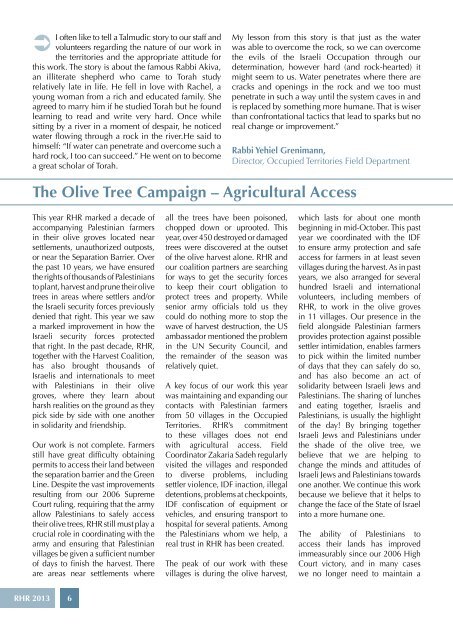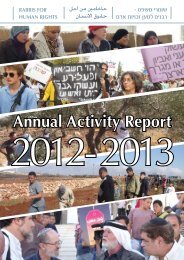Rabbis For Human Rights: The Annual Report 2012-2013
Rabbis For Human Rights: The Annual Report 2012-2013
Rabbis For Human Rights: The Annual Report 2012-2013
You also want an ePaper? Increase the reach of your titles
YUMPU automatically turns print PDFs into web optimized ePapers that Google loves.
I often like to tell a Talmudic story to our staff and<br />
volunteers regarding the nature of our work in<br />
the territories and the appropriate attitude for<br />
this work. <strong>The</strong> story is about the famous Rabbi Akiva,<br />
an illiterate shepherd who came to Torah study<br />
relatively late in life. He fell in love with Rachel, a<br />
young woman from a rich and educated family. She<br />
agreed to marry him if he studied Torah but he found<br />
learning to read and write very hard. Once while<br />
sitting by a river in a moment of despair, he noticed<br />
water flowing through a rock in the river.He said to<br />
himself: “If water can penetrate and overcome such a<br />
hard rock, I too can succeed.” He went on to become<br />
a great scholar of Torah.<br />
This year RHR marked a decade of<br />
accompanying Palestinian farmers<br />
in their olive groves located near<br />
settlements, unauthorized outposts,<br />
or near the Separation Barrier. Over<br />
the past 10 years, we have ensured<br />
the rights of thousands of Palestinians<br />
to plant, harvest and prune their olive<br />
trees in areas where settlers and/or<br />
the Israeli security forces previously<br />
denied that right. This year we saw<br />
a marked improvement in how the<br />
Israeli security forces protected<br />
that right. In the past decade, RHR,<br />
together with the Harvest Coalition,<br />
has also brought thousands of<br />
Israelis and internationals to meet<br />
with Palestinians in their olive<br />
groves, where they learn about<br />
harsh realities on the ground as they<br />
pick side by side with one another<br />
in solidarity and friendship.<br />
Our work is not complete. Farmers<br />
still have great difficulty obtaining<br />
permits to access their land between<br />
the separation barrier and the Green<br />
Line. Despite the vast improvements<br />
resulting from our 2006 Supreme<br />
Court ruling, requiring that the army<br />
allow Palestinians to safely access<br />
their olive trees, RHR still must play a<br />
crucial role in coordinating with the<br />
army and ensuring that Palestinian<br />
villages be given a sufficient number<br />
of days to finish the harvest. <strong>The</strong>re<br />
are areas near settlements where<br />
all the trees have been poisoned,<br />
chopped down or uprooted. This<br />
year, over 450 destroyed or damaged<br />
trees were discovered at the outset<br />
of the olive harvest alone. RHR and<br />
our coalition partners are searching<br />
for ways to get the security forces<br />
to keep their court obligation to<br />
protect trees and property. While<br />
senior army officials told us they<br />
could do nothing more to stop the<br />
wave of harvest destruction, the US<br />
ambassador mentioned the problem<br />
in the UN Security Council, and<br />
the remainder of the season was<br />
relatively quiet.<br />
A key focus of our work this year<br />
was maintaining and expanding our<br />
contacts with Palestinian farmers<br />
from 50 villages in the Occupied<br />
Territories. RHR’s commitment<br />
to these villages does not end<br />
with agricultural access. Field<br />
Coordinator Zakaria Sadeh regularly<br />
visited the villages and responded<br />
to diverse problems, including<br />
settler violence, IDF inaction, illegal<br />
detentions, problems at checkpoints,<br />
IDF confiscation of equipment or<br />
vehicles, and ensuring transport to<br />
hospital for several patients. Among<br />
the Palestinians whom we help, a<br />
real trust in RHR has been created.<br />
<strong>The</strong> peak of our work with these<br />
villages is during the olive harvest,<br />
My lesson from this story is that just as the water<br />
was able to overcome the rock, so we can overcome<br />
the evils of the Israeli Occupation through our<br />
determination, however hard (and rock-hearted) it<br />
might seem to us. Water penetrates where there are<br />
cracks and openings in the rock and we too must<br />
penetrate in such a way until the system caves in and<br />
is replaced by something more humane. That is wiser<br />
than confrontational tactics that lead to sparks but no<br />
real change or improvement.”<br />
Rabbi Yehiel Grenimann,<br />
Director, Occupied Territories Field Department<br />
<strong>The</strong> Olive Tree Campaign – Agricultural Access<br />
which lasts for about one month<br />
beginning in mid-October. This past<br />
year we coordinated with the IDF<br />
to ensure army protection and safe<br />
access for farmers in at least seven<br />
villages during the harvest. As in past<br />
years, we also arranged for several<br />
hundred Israeli and international<br />
volunteers, including members of<br />
RHR, to work in the olive groves<br />
in 11 villages. Our presence in the<br />
field alongside Palestinian farmers<br />
provides protection against possible<br />
settler intimidation, enables farmers<br />
to pick within the limited number<br />
of days that they can safely do so,<br />
and has also become an act of<br />
solidarity between Israeli Jews and<br />
Palestinians. <strong>The</strong> sharing of lunches<br />
and eating together, Israelis and<br />
Palestinians, is usually the highlight<br />
of the day! By bringing together<br />
Israeli Jews and Palestinians under<br />
the shade of the olive tree, we<br />
believe that we are helping to<br />
change the minds and attitudes of<br />
Israeli Jews and Palestinians towards<br />
one another. We continue this work<br />
because we believe that it helps to<br />
change the face of the State of Israel<br />
into a more humane one.<br />
<strong>The</strong> ability of Palestinians to<br />
access their lands has improved<br />
immeasurably since our 2006 High<br />
Court victory, and in many cases<br />
we no longer need to maintain a<br />
physical presence or intervene in<br />
order to ensure that farmers can<br />
harvest their olives. In the areas<br />
where Palestinians cannot go without<br />
prior coordination (either because of<br />
closure orders, fear, or because the<br />
army has convinced the Palestinians<br />
that they cannot or should not go on<br />
their own), the number of days that<br />
the army allocates to the harvest is<br />
still inadequate. Unlike last year, this<br />
year all villages we were in touch<br />
with succeeded in completing their<br />
harvest in areas next to settlements.<br />
However, four villages were not<br />
able to complete their harvesting<br />
on their lands trapped between the<br />
Separation Barrier and the 1967<br />
border; the army did not allow them<br />
enough days to reach these areas,<br />
or any at all. In this coming year,<br />
we intend to continue working with<br />
the army to increase the number of<br />
harvest days so that so that farmers<br />
can reach all of their olive groves.<br />
Although the presence of the army<br />
as well as our presence in the fields<br />
give Palestinian farmers an increasing<br />
sense of security while harvesting<br />
their olives, <strong>2012</strong> witnessed a<br />
sharp increase in damage to trees<br />
and property, particularly before<br />
the olive harvest even started. In<br />
just one week, for example, 450<br />
trees were damaged, destroyed,<br />
or stripped of their fruit in Yanun,<br />
Krayut, Ein Abbus and Meghayer.<br />
<strong>The</strong> economic cost of the damaged<br />
trees is immense, and the emotional<br />
cost is also great. As in previous<br />
years, RHR acted on several fronts<br />
to request army protection of trees<br />
and property. Our ongoing presence<br />
in the field and immediate response<br />
to violations continues to be the<br />
most effective way to address the<br />
challenges on the ground.<br />
This report covers both the <strong>2012</strong> and<br />
<strong>2013</strong> planting seasons. Each year,<br />
RHR provides approximately 3,000<br />
olive trees to be planted in areas in<br />
danger of takeover, or where settlers<br />
have cut, uprooted and/or burned<br />
Our ongoing presence<br />
in the field and<br />
immediate response<br />
to violations continues<br />
to be the most<br />
effective way to<br />
address the challenges<br />
on the ground.<br />
trees in acts of vandalism and arson.<br />
We have reduced the number of<br />
places where we bring Israelis to<br />
plant together with farmers because,<br />
in some cases, the farmers prefer<br />
not to attract attention. However, Tu<br />
B’Shvat, the Jewish new year for trees,<br />
continues to be the day in which we<br />
organize a major pubic planting,<br />
with many volunteers. In doing so,<br />
RHR presents a different Jewish face<br />
than that of the extremists who carry<br />
out the “price tag” attacks. In <strong>2012</strong>,<br />
despite army attempts to block our<br />
arrival, 22 people joined RHR in<br />
planting in El-Jenia village in the<br />
Northern West Bank, where a “Price<br />
Tag” attack had taken place days<br />
before. <strong>The</strong> army left after forcing us to<br />
leave, and the Palestinians were able<br />
to quietly resume work. Nineteen<br />
volunteers and staff members<br />
joined us in planting 50 trees at the<br />
kindergarten in the Jabal, in solidarity<br />
with the Jahalin Bedouin, who were<br />
threatened with being relocated<br />
to the garbage dump of Abu Dis in<br />
early <strong>2012</strong> (see below).<br />
In December <strong>2012</strong>, trees were cut<br />
down on lands belonging to farmers<br />
from A-Asawiya. Two days later,<br />
RHR volunteers joined Palestinians<br />
in replanting. In January <strong>2013</strong>, we<br />
planted trees in Kusra, an increasingly<br />
tense area. Less than a week later,<br />
on the very day we were helping<br />
Fawzi Ibrahim in nearby Jalud (see<br />
below), we discovered that some of<br />
our trees had been uprooted in the<br />
middle of the night. <strong>The</strong> windows<br />
of a tractor were shattered, and<br />
hundreds of rocks were thrown at<br />
the home of an elderly couple living<br />
on the outskirts of the village. We<br />
therefore returned on Tu B’Shvat<br />
with several busloads of volunteers,<br />
and the Palestinians indicated that<br />
they would set up a system to keep<br />
watch over the trees even at night.<br />
RHR <strong>2013</strong> 6<br />
7 RHR <strong>2013</strong>









